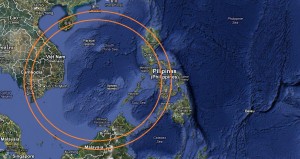US slams China over new garrison

The Department of State statement underscored US concerns about the situation in the resource-rich sea, a potential flash point. It voiced strong support for diplomatic efforts by Southeast Asian nations to negotiate with China, the region’s rising military power that is claiming virtually all of the sea for itself and would prefer that Washington stay out of the matter.
The US Senate on Thursday also urged restraint among the claimant states—China and five of its neighbors—and said the United States was committed to assisting Southeast Asian nations remaining “strong and independent.”
Washington’s response came 10 days after China formally established Sansha City on Woody Island in the Paracel chain, 350 kilometers from its southernmost province.
Sansha is intended to administer hundreds of thousands of square kilometers of water where China wants to strengthen its control over disputed and potentially oil-rich islands.
The Philippines, a US treaty ally, has described China’s move as unacceptable. Vietnam called it a violation of international law.
China says it controls much of the West Philippine Sea, but the Philippines, Brunei, Malaysia, Vietnam and Taiwan all claim portions of the sea. The Philippines and Vietnam have accused China of stepping up harassment at sea.
Increase in tensions
“We are concerned by the increase in tensions in the South China Sea and are monitoring the situation closely,” state department spokesperson Patrick Ventrell said in a statement.
“In particular, China’s upgrading of the administrative level of Sansha City and establishment of a new military garrison there covering disputed areas of the South China Sea run counter to collaborative diplomatic efforts to resolve differences and risk further escalating tensions in the region,” he said.
Ventrell also pointed to “confrontation rhetoric” and incidents at sea, saying: “The United States urges all parties to take steps to lower tensions.”
The State Department said the new city and military garrison, “run counter to collaborative diplomatic efforts to resolve differences and risk further escalating tensions in the region.”
Beijing has announced plans to set up such a garrison for Sansha, and has named officers to lead it, but has provided no other details.
Asean disarray
The US statement also followed an acrimonious annual meeting of the 10-member Association of Southeast Asian Nations (Asean) last month, where for the first time in its 45-year history, the bloc failed to issue a joint communiqué. The host country, Cambodia, viewed as pro-Beijing, rejected a proposal by the Philippines and Vietnam to mention their separate territorial disputes with China.
The United States has rallied behind Southeast Asian nations, expanding military ties with the Philippines and Vietnam. President Barack Obama has decided to send Marines to Australia in a further show of US power in Asia.
US Senate resolution
The US Senate approved a resolution late Thursday that “strongly urges” all regional nations to exercise self-restraint and to refrain from permanently inhabiting points in the West Philippine Sea until a code of conduct is reached.
The resolution, sponsored by senators from both major parties, declared that the United States was committed “to assist the nations of Southeast Asia to remain strong and independent.”
During a 2010 visit to Vietnam, Secretary of State Hillary Clinton declared that the United States had a national interest in freedom of navigation in the West Philippine Sea, through which half of world cargo passes.
The State Department statement on Friday reiterated that the United States has an interest in stability and “unimpeded lawful commerce” in the West Philippine Sea but that Washington does not take a position on rival claims.
China also has separate disputes with US ally Japan in the East China Sea, an issue discussed by Japanese Defense Minister Satoshi Morimoto on a visit to Washington Friday.
Resolve disputes peacefully
US Defense Secretary Leon Panetta, addressing a joint news conference with Morimoto, voiced hope for further progress in a code of conduct on the West Philippine Sea.
“The last thing we want is to have direct confrontation in the South China Sea with regard to jurisdictional issues,” Panetta said.
“Those should be resolved peacefully, and they should be resolved pursuant to a code of conduct. And the United States will do whatever we can to work with Japan and others to ensure that that is the approach we take,” he said.
The code of conduct would aim to set rules to reduce the chances of a spat over fishing, shipping rights or oil and gas exploration tipping into an armed conflict.
Robert Manning, a senior fellow at the Atlantic Council and former US government strategist, said that China may have set up the garrison as a way to counter the recent US military focus on Asia.
“To be sure, China is well aware that its assertiveness is not well received in East Asia, and tends to lead smaller nations to tilt to the US to balance China,” Manning wrote in an essay released by his think tank.
For comprehensive coverage, in-depth analysis, visit our special page for West Philippine Sea updates. Stay informed with articles, videos, and expert opinions.